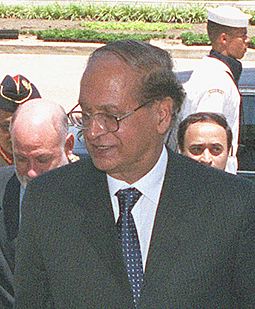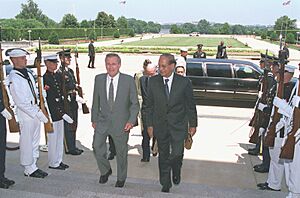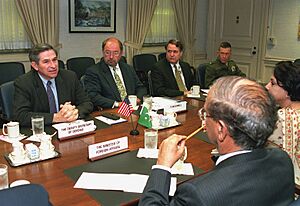Abdul Sattar (diplomat) facts for kids
Quick facts for kids
Abdul Sattar
|
|
|---|---|

Abdul Sattar
|
|
| Minister of Foreign Affairs | |
| In office 6 November 1999 – 14 June 2002 |
|
| President | Pervez Musharraf |
| Preceded by | Sartaj Aziz |
| Succeeded by | Khurshid Kasuri |
| In office 23 July 1993 – 19 October 1993 |
|
| President | Ghulam Ishaq Khan |
| Preceded by | General Yakub Khan |
| Succeeded by | Aseff Ali |
| 17th Foreign Secretary of Pakistan | |
| In office 31 May 1986 – 2 August 1988 |
|
| Preceded by | Niaz A. Naik |
| Succeeded by | Humayun Khan |
| Personal details | |
| Born |
Abdul Sattar
1931 |
| Died | (aged 88) Islamabad, Islamabad Capital Territory, Pakistan |
| Resting place | Islamabad |
| Citizenship | Pakistan |
| Nationality | Pakistani |
Abdul Sattar (1931 – 23 June 2019) was a very important Pakistani diplomat and expert in how countries deal with each other. He was also a political scientist, which means he studied how governments work.
He worked for Pakistan's foreign service for many years. He even served as the Foreign Minister of Pakistan two times. People thought he was very good at his job. One reviewer called him "one of the shrewdest foreign policy practitioners" Pakistan ever had.
Contents
Biography
Foreign Service Career
Abdul Sattar started his career in the foreign service in the mid-1950s. This is like being a country's representative in other nations. He helped with important agreements, like the Simla Agreement in 1972.
He served as an ambassador to many countries. He was Pakistan's ambassador to Austria in 1975. Later, he was the High Commissioner (a type of ambassador) to India from 1978 to 1982, and again from 1990 to 1992. He also worked as the ambassador to the Soviet Union from 1988 to 1990.
From 1986 to 1988, he was the Foreign Secretary. This is a very senior role in the foreign office. He also worked as the Permanent Representative to the International Atomic Energy Agency (IAEA) in Vienna.
Nuclear Strategy and Overview
Abdul Sattar also played a role in Pakistan's nuclear policy. He had discussions with scientists about nuclear issues. He helped Pakistan decide its approach to atomic weapons.
He argued that having nuclear weapons could help keep peace. He believed it could stop wars, even during difficult times. He also helped Pakistan negotiate about nuclear treaties in 1999.
Foreign Minister

On 6 November 1999, Abdul Sattar became the Foreign Minister under President Pervez Musharraf. He was one of the first members of the National Security Council.
He worked to improve relations with the United States. After the 9/11 attacks in 2001, he helped Pakistan decide to cooperate with the US on the War on Terror. He said Pakistan would agree to US demands but also share its own thoughts.
Abdul Sattar also helped arrange the Agra summit in India in 2001. This was a meeting between leaders of India and Pakistan. However, the talks did not lead to a final agreement.
Resignation
In June 2002, Abdul Sattar resigned from his job as Foreign Minister. He said it was for health reasons. Some reports suggested he felt the Foreign Office was not being fully involved in important decisions.
Academia and Professorship

After his long career in foreign service, Abdul Sattar wrote many articles. He wrote about foreign policy and nuclear strategy for newspapers like Pakistan Observer.
In the 1990s, he worked at the United States Institute of Peace. There, he wrote a paper called "Reducing Nuclear Dangers in South Asia". He argued that Pakistan had good reasons to develop nuclear weapons. He also suggested ways for nuclear countries to work together for peace.
He also wrote about the Shimla Pact and contributed to a book about Pakistan's foreign policy.
Critical Literature
- Shahi, Abdul Sattar ; foreword by Agha (2010). Pakistan's foreign policy,1947–2009 : a concise history (2nd ed.). Karachi: Oxford University Press. ISBN 978-0199060238.
 | Kyle Baker |
 | Joseph Yoakum |
 | Laura Wheeler Waring |
 | Henry Ossawa Tanner |

